#despite their different economic and social standings
Explore tagged Tumblr posts
Text

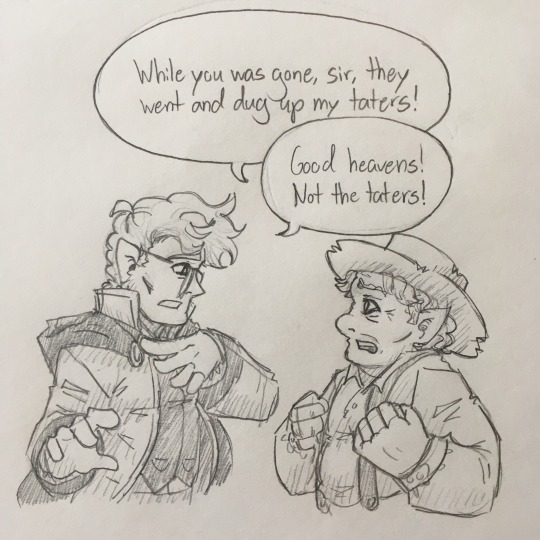
MY CABBAGES
#frodo baggins#gaffer gamgee#lord of the rings#lotr#my art#fig tree au#now back to your regularly scheduled programming#this whole conversation is so sweet and so funny lol#frodo just saved the world! but the gaffer doesn’t know and doesn’t care#all he cares about are his taters#but frodo is humble; and if it’s important to the gaffer then it’s not too small a thing to be important to frodo too#and i love that the gaffer feels bold enough to ‘pick a bone’ in the first place#it says very good things about how much respect and trust and love there is between the bagginses and the gamgees#despite their different economic and social standings#it’s just so sweet =^-^=
85 notes
·
View notes
Text
Thousands of people did not just suddenly stop using headphones one day because they felt like it, or because they stopped caring about people with sensory sensitivities like me. No, people stopped using headphones because cell phone manufacturers stopped including headphone jacks in their products.
My sensory-processing issues are a physical element of my disability that would absolutely still exist in a world without capitalism. Like my poor fine motor control and reduced muscle tone, my sensory processing issues debilitate me: there are tasks I simply cannot perform because of how my body is wired, and this makes me different from most other people in ways that are non-negotiable. Still, my physical disabilities are worsened quite clearly by capitalism: Because large corporations have both a profit motive and a vested interest in reinvesting those profits into advertisements, and because the internet does not receive public financial support, my daily life is bombarded with bright, noisy, flashing, disruptive advertisements, which makes it far more difficult for me to process relevant information and can swiftly bring me to the verge of a meltdown. If the internet were funded as a public utility and was therefore not sandblasted in ads, I would be less disabled. If my local streets were less plastered in billboards and littered with junk mail advertising chain restaurants, I would be less disabled.
Because companies like Apple financially rely upon consumers replacing their phones on an annual basis (despite how unsustainable and murderously cruel continuing to mine cobalt in Sudan for the production of all these new phones is), I must replace my phone regularly. With an updated phone model I lose my headphone jack and have to adapt to a new operating system and layout, and so my sensory issues and executive functioning challenges are exacerbated. In a world where phones were produced in order to help human beings function rather than to make money, I would be less disabled. Thanks to capitalism, I cannot exist in public if I am not purchasing anything. I cannot simply be present in a store, coffee shop, or even public plaza, enjoying my surroundings and taking the sight of other people in. I must contribute to the economy in order to justify it. If the brickwork of a nearby building fascinates me and I crave to feel it against my palms, I have to pretend that I wish to buy it, and be prepared to tell anyone who asks that that’s what I intend to do. I can’t even stand on the corner and feel the sun on my face without worrying my neighbors might find it unusual and send the cops. As an Autistic person, I often can’t fake being a perpetual consumer well enough. My desire to simply elope around my environment and take in new, interesting sensations registers as suspicious or concerningly mentally ill. And so I am further disabled and excluded from public life.
The full essay is free to read or have narrated to you at drdevonprice.substack.com
506 notes
·
View notes
Text
Eloise and Cressida, my thoughts.
I’ve seen quite a few posts about these two but nothing that really reflected my perspective, so here goes.
Cressida
I’m actually excited to dig into her character more, to this point she has been a two dimensional villain which I understand. As the audience we aren’t meant to like Cressida. In the books, the Bridgertons and Penelope dislike her due to her cutting remarks and slimy nature. She is a straight forward villain with no complexities to her character. However the show delves into the shades of grey around the characters and presents them all as flawed complicated beings which means this book narrative of Cressida doesn’t really fit within that. I’m excited to find out what lies beneath.
I also think this friendship will begin to introduce Benedict’s Sophie’s storyline as I think Sophie’s stepfamily will be the Cowpers. It will provide a link between the Bridgerton’s and Sophie and the show loves a link.
Eloise
I think Eloise has been behaving like a typical girl her age, she’s a teenager and as such she thinks the world revolves around her. Now don’t get me wrong, I enjoy Eloise’s character, she has some cracking lines and Claudia Jessie plays her brilliantly. However Eloise is very caught up in herself.
When it comes to her friendship with Penelope she assumes that Penelope wants what she wants, thinks what she thinks and doesn’t ever really consider that might not be true. Eloise is blind to their very differing social standing, very different family situations and dynamics and how that affects them. As we saw in season 1, Eloise didn’t believe Penelope would be interested in marriage because she herself is not interested in it. Eloise has a supportive family, who despite their bickering want happiness for each other. Penelope has a family that constantly mocks, belittles and dismisses her. Eloise can depend on her family, Penelope can not. The Bridgertons are able to weather a certain amount of scandal whereas the Featheringtons cannot. Which would mean, regardless of whether Penelope wanted an epic love story or not Eloise should have been aware enough of her friends situation to know that she likely would need to marry for economic reasons if nothing else.
I am not convinced that Eloise is aware of Penelope’s crush. The line from the trailer from Eloise to Colin about since when did he care about Penelope suggests that she may not. When I look back at the last two seasons there’s no evidence to suggest that she is aware. She wouldn’t have seen them dancing in either season. The first season she wasn’t at the balls because she wasn’t out yet and the second season, we only saw Colin and Pan dance once at the Featherington ball and Eloise would have been ransacking Pen’s room at the time. Whenever Colin and Pen are talking in season 2 Eloise would show up and whisk Pen away which could be indicative of how she views their conversations as trivial and unimportant. I don’t think she is aware that they have formed their own relationship separate to her. I think she will have assumed they converse because of her, she is the link and without her what would they have to talk about.
However Eloise questioning Colin in the trailer about whether Penelope is trying to make him her husband could be because she is aware of the crush but has chosen to ignore it? I don’t know. I am interested to see how they play it.
I think what I am getting at is that Eloise doesn’t really know Pen like Pen knows her. Their friendship isn’t equal, Pen is desperate to please Eloise as we saw in season 2 when she writes a whistledown article that reflects Eloise’s thoughts about womanhood. I think their falling out will have a big impact on Eloise and their journey to reconciliation will be key to her her developing into from a teenager to an adult. To Eloise realising that others thoughts and opinions are different to her own but just as valid, that not everyone is as they appear to be, that her life whether she likes it or not is changing. I think her relationships with her siblings will develop, she will hopefully begin to see that they are all carrying a burden and are all a little lost.
I am hopeful that her friendship with Cressida will start some of these things in motion. It must lead her to question what she thinks of people if she befriends a person she believed to be awful. I don’t think she has befriended her to spite Penelope. I think they bond over something and I think Eloise will see the complexities of Cressida’s character and really learn that friendship is just as complex which will lead her to reflect on what happened with Penelope.
That’s my two cents. I could be wrong. I often am. What do you think?
#bridgerton#bridgerton season 3#eloise bridgerton#cressida#polin#authors#colin x penelope#colin bridgerton
49 notes
·
View notes
Note
if blood/caste = troll gender, then what would that make karkat? off the top of my dome, it immediately reads to me that he would be considered intersex or trans, both even, and at a glance, narratively that feels cohesive. i dont have anything to counter this reading, just curious on your thoughts!!
generally speaking i find it kind of a waste of time to try to identify "exact equivalents" in any given fictional allegory. blood castes are very much like troll genders and i think that's the most pertinent interpretation to homestuck's core themes, but the benefit of inventing a fictional system rather than straight up saying the trolls are segregated on the basis of sex is that the analogy doesn't have to be perfect and it can be used to represent different things at different times - the hemospectrum being a gender spectrum isn't mutually exclusive with the fact that it is also an economic hierarchy, for instance. a lot of discussions about "coding" in fiction end up languishing in the shallows by ignoring this.
so in terms of what the hemospectrum "makes karkat" i don't really think of it in terms of the exact thing that he would be on earth, bc i think the story adequately communicates the broad strokes; that whatever he is, in society's eyes he believes the circumstances of his birth cause him to fall short of the expectations that come with the strict categories alternia expects all trolls to fit into. i have to assume a lot of readers picking up on this is what led to trans guy karkat being such a hugely popular headcanon (besides trans guy headcanons having simply been the most popular thing full stop for a long time), which i think makes complete sense. i also think there are clear lines to be drawn between blood colour and biological sex in the way that biology never cleanly lines up with the social expectations associated with it, and even if i'm not totally sure terminology like "intersex" applies in the same way in a culture with 10+ genders as it does in a culture with just 2, the fact that trolls have a linear "spectrum" of genders clearly lends itself to this kind of thinking.
(this kind of harkens back to a years-old homestuck discourse: a lot of readers took issue with the suggestion that, despite being called a spectrum, in spinoff stories the troll blood colours are always depicted as fitting into twelve discrete categories. but long before i even began to explore the direct intersections between gender, sex and blood colour, the logic behind this seemed clear to me: surely all trolls ARE different and DO have subtly different shades to their blood, but in order to maintain a caste system where each blood colour has its place in the social order, alternian society has to act like there are only 12 colours. this is, after all, exactly how astrological signs are assigned; you can be born on any of 365 days in a year, but for the sake of neatly dividing the population into easily-described groups, each of these days is split among 12 basically-arbitrary signs. this clear parallel homestuck draws between gender and star sign is also why i find it so hard to take class and aspect seriously.)
so even if i don't think either of your options are necessarily what karkat's character is "intended" to convey in the same way i believe caste-as-gender as an intended reading, the versatility of the caste analogy makes them both very organic interpretations. BUT TO ACTUALLY GET TO YOUR QUESTION LOL: like i said in a previous ask, karkat comes across to me as being closeted. in conjunction with his chronically unorthodox approach to troll romance and the role he plays as homestuck's introduction to LGBT themes long before "trolls are bisexual" establishes itself as a canon fact, karkat reads as "the troll version" of a gay guy hiding this fundamental "flaw" in his being because he feels it's standing between him and the all-american ultra-masculine role he sees for himself among the threshecutioners. so like i said above i don't think it necessarily has to be about his "gender" so much as it is about his relationship to expectations of gender, just as troll-caste genders exist across a whole spectrum of expectations rather than in a strict binary.
#homestuck#ok promise i genuinely did not expect this response to be so long this time#you just reminded me of like five other conversations i needed to voice my opinion on LOL;
33 notes
·
View notes
Text

In 1984, the town of Merthyr Tydfil in Wales was alive with the raw energy of the punk and skinhead subcultures. The fusion of these two groups might have seemed unlikely to some, but in Merthyr, the kids were united. The town’s working-class roots provided a natural backdrop for these rebellious movements. “The kids, they didn’t care about the boundaries others tried to put on them,” said one local who witnessed the era. “They were united by a common spirit, a love for music, and a desire to stand against the norms of society.”
Punks and skins shared a mutual respect for individuality and non-conformity. Despite their differences in fashion—punk’s DIY ethos versus the skinhead’s sharp style—both groups found common ground through music, particularly the explosion of punk rock and Oi! bands that captured the frustrations of youth in the 80s. Merthyr was a town that didn’t have much going for it economically, but it had a thriving scene of youth culture that made it feel alive and defiant.
Merthyr’s punks and skins often gathered together at local venues or on street corners, where they would swap stories, trade records, and discuss their political views. The tension of the times, fueled by high unemployment and social discontent, gave their movement a sense of urgency. They were not just a fashion statement but part of a larger push for change. “We weren’t just looking for a fight,” one former skinhead remarked, “we were looking for something that felt real, something that made sense in a world that didn’t.”
The camaraderie between the two groups in Merthyr was a testament to the power of music and shared experience. The streets were their stage, and together, they created a culture that was both an escape and a protest. For the youth of Merthyr, it wasn’t just about rebellion; it was about identity. The punk and skinhead scenes represented the defiance of a generation that had grown tired of being ignored. “The unity of the punks and skins in Merthyr wasn’t something that could be easily broken,” said another local. “It was built on mutual respect and the desire to live free.”
The legacy of this era is still remembered fondly by those who lived through it, as a time when the kids were truly united, standing together for something they believed in.
9 notes
·
View notes
Text
Predicting the Class Warfare Plotline in Kai-hen Wizards
At first glance, Kai-Hen Wizards seems to be a perfectly normal fantasy shonen manga. With supernatural powers wreaking havoc on the world, a seemingly amnesiac prince, and immortal wizards standing atop everything, this seems like an unlikely place to find a metaphor for class warfare.
And yet, with socialism being a main theme of the author's previous work, there are already hints even just a mere 4 chapters in that Kai-Hen Wizards, too, will shape up to be a story about class warfare.
Mana and Gems
It's very clear that mana and gems are a major form of capital of this universe.

It's very telling that THIS is the first real piece of worldbuilding regarding the mana. A typical series might hone in on what the 7 different colors represent, or what types of spells one might be able to cast, but the aspect of the magic that is spotlit first... is its economic importance.
Another point of interest is how mundane those objects in the bottom left corner are. On one hand, it is almost SO mundane that it breaks the fantasy world immersion, but at the same time it really drives the point home that "even ordinary people use them every day". Gems are not actually gatekept from the masses.

What's fascinating is the section about the Seven: they're so powerful they can form gems themselves.
It's reading very much as: they do not need to labor in order to gain more wealth; they are so rich already that gems have just become a form of passive income making them richer.
The Prince

It's not just anybody who can become a wizard's apprentice, says Raichi. It ought to be someone who has a high tolerance for mana, and someone who has mana to start with.
If you do not have capital to start with, how can you possibly go about investing it and refining it into something more powerful?

Of course, there's the in-universe explanation that mana itself is toxic to the natural world. I actually quite like this aspect of the worldbuilding; it's a very obvious continuation of the ideas explored in late Kekkaishi, with the toxic mana being a climate change metaphor, but now explicitly tied to capitalism.
Even though Raichi clearly wants to be an apprentice, she feels that she is inferior to the prince when it comes to mana, and cedes that position to him even though she wants it a million times more than he does.
In fact, she's deeply frustrated by the prince's lack of interest in becoming Zemu's apprentice.

Becoming a wizard's apprentice means inheriting their spells (wealth), and magical domain (land), and is equivalent to being royalty (social status). Wizards are the bourgeois of this universe, who hoard wealth and pass it on only to those who are already in the same class as them.
The prince, who is both of high social status (being a prince), and also already possess great wealth (represented by his mana/mana tolerance), is poised perfectly to inherit the position of wizard. But his interests lie elsewhere...
The Liberation of Humans
Well, the prince doesn't think of it like that, obviously. But he DOES want Roue back, and it's clear he wants her back in a way that is specifically OUTSIDE their preexisting prince-and-wizard dynamic. He has never wanted to be a prince, and he never loved Roue because she was a wizard. He wants to live in a world where he and his favorite human can live without those socioeconomic restraints.
But beyond the social and economic classes we've already discussed, there's a third axis of oppression in this world: race.
It's made very clear that the castle has no humans in it, and hasn't ever had them because Zemu, apparently, hates humans (despite the fact he used to be one? more on this later). The inhabitants of the castle are clearly unfamiliar with interacting with humans, relying on stereotypes to make sense of the prince's behavior.

So, you're an Asian kid. Is that right? What do you like? It didn't read as a microaggression the first time around, but if someone said this to me in real life I'd definitely be thinking "why did my race have to be a prerequisite to this conversation???"
In fact, I think the prince's first encounter with Raichi is extremely telling.

She's racist!! She's fucking racist!!! We're in a world where it's apparently okay to call humans "primitives" like it's no big deal!
And YET even though Raichi clearly sees herself as superior to the prince from a racial point of view, she STILL cedes the position of apprentice to him based on the differences in their economic class! In fact she is actively upset that the prince is seemingly refusing all these great perks of apprenticeship... for no reason. After all, to her, who grew up in this capitalistic system, the pressure to climb is second nature.
The Altitude Motif
We had one of these in BIRDMEN as well! In that series, the ever increasing altitude represented the ascension to godhood (which itself was a metaphor for dictatorship). However, I believe in Kai-Hen Wizards, the altitude is actually supposed to represent the capitalistic pressure to climb. To hustle, to grind, to make those big bucks, to wring more money out of the system, to get that promotion, to move up in society.
The prince wakes up in the basement of the castle with no memories.

Throughout the first chapter, as he remembers more and more about his past, his status as royalty, and his role as the flying country's treasure, he is funneled higher and higher into the castle, even as he tries to escape.



Raichi articulates what the castle signals to the prince: you should only want to go up! Why would you ever want to go down? Or, god forbid, leave this castle and this system entirely?
What strikes me as interesting is this page in particular, where he notices the locked doors.

I think it's no coincidence that it's revealed in Chapter 4 that what doors he CAN open lead downwards.


THIS is the out from the system that the prince was looking for in the first chapter. And yet, in order to open more doors, he must participate in the castle's system.


You'll have to put your nose against the grindstone, to work within the castle in order to even attempt to leave it, and even then, the fulfillment of your wishes is not guaranteed.
And what DOES Zemu stand to gain from all this?
Quelling the Rage
In what is possibly the most self-aware protagonist monologue of all time, the prince says the following:

It's not just an incredibly self-aware examination of his mental state, it also succinctly summarizes the idea that those who stand to lose nothing are the most easily moved to violence in order to gain what they want. It's not framed in a socioeconomic way in this case, but it is nonetheless true. (Don't think about unnecessary things, Zemu adds.)
So what is Zemu's response to this threat? To dangle the prospects of freedom in front of the prince. To almost, just barely promise him the possibility of leaving this castle.

You want. You hunger. So I'll use that to my advantage, and I'll and wring as much profit from that desperation.

Don't say that you have nothing! You have so much potential (economic) value! You have so much (economic) worth! Don't say you have nothing! Provide your labor in my castle and feel content! Put down your proletariat rage. I have uses for you yet.
Zemu, the Ex-Human
What a fascinating character.
He's an immortal wizard who hates humans, and yet he used to be one himself. He can't let go of the mundane activity of eating, even though he no longer needs to do that.
I can't put it more succinctly than Disco Elysium did, the truth...

I suspect that in Zemu's journey to becoming an immortal wizard, he became so distanced from his fellow humans that he began to feel uncomfortable among them, finding himself to have more in common with the more privileged anthros.
Forecasting the Prince's Character Arc
Zemu's past, I think, is going to be the blueprint for the prince's character arc.
Right now, the prince we know, who has just cut his hair and treasures Roue deeply, is the version of himself that is most true to himself. THIS is the person he's always viewed himself as, even if he wasn't allowed to live like it. He cuts his hair immediately, despite the fact it lowers his mana and it went against the custom of keeping sharp tools away from royalty. He gets to eat the foods that he wants, he gets to help around the castle instead of being treated like glass.
But at the same time, he has clear goals. First, to bring Roue back, and second, to escape this castle. The more he learns about the castle, the more he realizes he will likely have to become Zemu's apprentice in order to achieve both of these goals.


In order to open the doors leading out, he must move up in the castle's society.
I think he will experience a gradual loss of the self, where his love for Roue, and his distaste for power will be eclipsed by the chase for ever more capital/mana. The long hair he once despised will be grown back once more to maximize his mana, and when he finally gains the ability to leave the castle and bring Roue back, he will no longer want to. He has cut off so much of himself in order to gain these powers he has become unrecognizable to himself. He will become Zemu's image.
But hey, wait!! Doesn't that make for kind of a depressing story?!
Well, it's a good thing that I feel like that's just going to be the first act of the series. Tanabe may write bittersweet tragedies, but she tends to add a hopeful spin to the endings. And we haven't even gotten to...
The Wizard Killers
What's the deal with the immortality anyways? Shouldn't you be born immortal? How can you BECOME immortal? This just smells too sweet for it not to have a cost...
I suspect there's some philosopher's stone-esque shenanigans going on here, where the lives of (likely, but probably not exclusively) humans are used to form the basis of the immortality (a metaphor for the exploitation of "inferior races", naturally). Thus, to kill an immortal... you simply need to cut off their source of lives.
This could explain the part of Zemu's characterization which is extremely reluctant to take on the prince as an apprentice. It could be that he knows the immortality is built on the exploitation of humans, and while he benefits from it now and he doesn't want to NOT be immortal anymore, he also feels guilty subjecting other humans to this same moral dilemma. (This may also explain why he refuses to keep humans in the castle-- guilt.)
It would follow naturally that the Wizard Killers are a group of human revolutionaries seeking to dismantle the rule of the wizards so their lives will no longer be used as fuel for the wizards' immortality. Obviously the anthros look upon the Wizard Killers with great fear as well, because they see themselves as closer to immortals than those primitive humans, even though they too are oppressed by the capitalistic wizard system.
I think the prince's awakening and radicalization will happen when the Wizard Killers arrive on Zemu's doorstep. I can see this happening in a few ways:
Roue is the vanguard of the Wizard Killers. There's no way he wouldn't be swayed if it was Roue there to turn the tables. Roue VS All the Capitalistic Wealth I've Accumulated: WHO WOULD WIN? (What??? But isn't Roue dead??? Well... what if the prince and Roue swapped heads... and both of them are actually still alive... <- I don't have the energy to expand on this in this post. It deserves its own, albeit much shorter, post. Or maybe it'll just get directly jossed this week)
The gardener, who we haven't actually seen yet, is a Wizard Killers sympathizer, and if they end up having a close relationship with the prince, could possibly radicalize him by coming out as a Wizard Killer when the rest of them arrive.
okay yeah I don't see a third way yet but also we only have 4 chapters so far so I think I should be forgiven for this
Either way I do feel like this is a largely incomplete picture of what's going on in the universe. We've only met one of the other wizards, and we still barely know what the kai-hen actually is. However I do feel fairly confident in the "the prince becomes Zemu"/"minority representation in elite society will not actually liberate said minority because the time spent amongst elites will fundamentally change you" prediction... if I'm wrong we can all point and laugh as it gets jossed week by week. and I guess I'll have the outline for a cool kaihen fanfiction
15 notes
·
View notes
Text
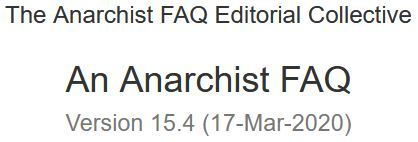
G.3.5 Would individualist anarchists have accepted “Austrian” economics?
One of the great myths perpetrated by “anarcho”-capitalists is the notion that “anarcho”-capitalism is simply individualist anarchism plus “Austrian” economics. Nothing could be further from the truth, as is clear once the individualist anarchist positions on capitalist property rights, exploitation and equality are understood. Combine this with their vision of a free society as well as the social and political environment they were part of and the ridiculous nature of such claims become obvious.
At its most basic, Individualist anarchism was rooted in socialist economic analysis as would be expected of a self-proclaimed socialist theory and movement. The “anarcho”-capitalists, in a roundabout way, recognise this with Rothbard dismissing the economic fallacies of individualist anarchism in favour of “Austrian” economics. “There is,” he stated, “in the body of thought known as ‘Austrian economics,’ a scientific [sic!] explanation of the workings of the free market … which individualist anarchists could easily incorporate into their so political and social Weltanshauung. But to do this, they must throw out the worthless excess baggage of money-crankism and reconsider the nature and justification of the economic categories of interest, rent and profit.” Yet Rothbard’s assertion is nonsense, given that the individualist anarchists were well aware of various justifications for exploitation expounded by the defenders of capitalism and rejected everyone. He himself noted that the “individualist anarchists were exposed to critiques of their economic fallacies; but, unfortunately, the lesson, despite the weakness of Tucker’s replies, did not take.” [“The Spooner-Tucker Doctrine: An Economist’s View”, Op. Cit., p. 14] As such, it seems like extremely wishful thinking that the likes of Tucker would have rushed to embrace an economic ideology whose basic aim has always been to refute the claims of socialism and defend capitalism from attacks on it.
Nor can it be suggested that the individualist anarchists were ignorant of the developments within bourgeois economics which the “Austrian” school was part of. Both Tucker and Yarros, for example, attacked marginal productivity theory as advocated by John B. Clark. [Liberty, no. 305] Tucker critiqued another anarchist for once being an “Anarchistic socialist, standing squarely upon the principles of Liberty and Equity” but then “abandon[ing] Equity by repudiating the Socialistic theory of value and adopting one which differs but little, if any, from that held by the ordinary economist.” [Op. Cit., no. 80, p. 4] So the likes of Tucker were well aware of the so-called marginalist revolution and rejected it.
Somewhat ironically, a key founders of “Austrian” economics was quoted favourably in Liberty but only with regards to his devastating critique of existing theories of interest and profit. Hugo Bilgram asked a defender of interest whether he had “ever read Volume 1 of Böhm-Bawerk’s ‘Capital and Interest’” for in this volume “the fructification theory is … completely refuted.” Bilgram, needless to say, did not support Böhm-Bawerk’s defence of usury, instead arguing that restrictions in the amount of money forced people to pay for its use and ”[t]his, and nothing else, [causes] the interest accruing to capital, regarding which the modern economists are doing their utmost to find a theory that will not expose the system of industrial piracy of today.” He did not exclude Böhm-Bawerk’s theory from his conclusion that “since every one of these pet theories is based on some fallacy, [economists] cannot agree upon any one.” The abolition of the money monopoly will “abolish the power of capital to appropriate a net profit.” [Op. Cit., no. 282, p. 11] Tucker himself noted that Böhm-Bawerk “has refuted all these ancient apologies for interest — productivity of capital, abstinence, etc.” [Op. Cit., no. 287, p. 5] Liberty also published a synopsis of Francis Tandy’s Voluntary Socialism, whose chapter 6 was “devoted to an analysis of value according to the marginal utility value of Böhm-Bawerk. It also deals with the Marxian theory of surplus value, showing that all our economic ills are due to the existence of that surplus value.” [Op. Cit., no. 334, p. 5] Clearly, then, the individualist anarchists were aware of the “Austrian” tradition and only embraced its critique of previous defences of non-labour incomes.
We have already critiqued the “time preference” justification for interest in section C.2.7 so will not go into it in much detail here. Rothbard argued that it “should be remembered by radicals that, if they wanted to, all workers could refuse to work for wages and instead form their own producers’ co-operatives and wait for years for their pay until the producers are sold to the consumers; the fact that they do not do so, shows the enormous advantage of the capital investment, wage-paying system as a means of allowing workers to earn money far in advance of the sale of their products.” And how, Professor Rothbard, are these workers to live during the years they wait until their products are sold? The reason why workers do not work for themselves has nothing to do with “time preference” but their lack of resources, their class position. Showing how capitalist ideology clouds the mind, Rothbard asserted that interest (“in the shape of ‘long-run’ profit”) would still exist in a “world in which everyone invested his own money and nobody loaned or borrowed.” [Op. Cit., p. 12] Presumably, this means that the self-employed worker who invests her own money into her own farm pays herself interest payments just as her labour income is, presumably, the “profits” from which this “interest” payment is deducted along with the “rent” for access to the land she owns!
So it seems extremely unlikely that the individualist anarchists would have considered “Austrian” economics as anything other than an attempt to justify exploitation and capitalism, like the other theories they spent so much time refuting. They would quickly have noted that “time preference”, like the “waiting”/“abstinence” justifications for interest, is based on taking the current class system for granted and ignoring the economic pressures which shape individual decisions. In Tucker’s words (when he critiqued Henry George’s argument that interest is related to time) “increase which is purely the work of time bears a price only because of monopoly.” The notion that “time” produced profit or interest was one Tucker was well aware of, and refuted on many occasions. He argued that it was class monopoly, restrictions on banking, which caused interest and “where there is no monopoly there will be little or no interest.” If someone “is to be rewarded for his mere time, what will reward him save [another]‘s labour? There is no escape from this dilemma. The proposition that the man who for time spent in idleness receives the product of time employed in labour is a parasite upon the body industrial is one which … [its supporters] can never successfully dispute with men who understand the rudiments of political economy.” [Liberty, no. 109, p. 4 and p. 5] For Joshua King Ingalls, “abstinence” (or the ability to “wait,” as it was renamed in the late nineteenth century) was “a term with which our cowardly moral scientists and political economists attempt to conjure up a spirit that will justify the greed of our land and money systems; by a casuistry similar to that which once would have justified human slavery.” [“Labor, Wages, And Capital. Division Of Profits Scientifically Considered,” Brittan’s Quarterly Journal, I (1873), pp. 66–79]
What of the economic justification for that other great evil for individualist anarchists, rent? Rothbard attacked Adam Smith comment that landlords were monopolists who demanded rent for nature’s produce and like to reap where they never sowed. As he put it, Smith showed “no hint of recognition here that the landlord performs the vital function of allocating the land to its most productive use.” [An Austrian Perspective on the History of Economic Thought, vol. 1, p. 456] Yet, as Smith was well aware, it is the farmer who has to feed himself and pay rent who decides how best to use the land, not the landlord. All the landlord does is decide whether to throw the farmer off the land when a more profitable business opportunity arrives (as in, say, during the Highland clearances) or that it is more “productive” to export food while local people starve (as in, say, the great Irish famine). It was precisely this kind of arbitrary power which the individualist anarchists opposed. As John Beverley Robinson put it, the “land owner gives nothing whatever, but permission to you to live and work on his land. He does not give his product in exchange for yours. He did not produce the land. He obtained a title at law to it; that is, a privilege to keep everybody off his land until they paid him his price. He is well called the lord of the land — the landlord!” [Patterns of Anarchy, p. 271]
Significantly, while Rothbard attacked Henry George’s scheme for land nationalisation as being a tax on property owners and stopping rent playing the role “Austrian” economic theory assigns it, the individualist anarchists opposed it because, at best, it would not end landlordism or, at worse, turn the state into the only landlord. In an unequal society, leasing land from the state “would greatly enhance the power of capitalism to engross the control of the land, since it would relieve it of the necessity of applying large amounts in purchasing land which it could secure the same control of by lease … It would greatly augment and promote the reign of the capitalism and displace the independent worker who now cultivates his own acres, but who would be then unable to compete with organised capital … and would be compelled to give up his holding and sink into the ranks of the proletariat.” [Joshua King Ingalls, Bowman N. Hall, “Joshua K. Ingalls, American Individualist: Land Reformer, Opponent of Henry George and Advocate of Land Leasing, Now an Established Mode”, pp. 383–96, American Journal of Economics and Sociology, Vol. 39, No. 4, p. 394]
Given Tucker’s opposition to rent, interest and profit is should go without saying that he rejected the neo-classical and “Austrian” notion that a workers’ wages equalled the “marginal product,” i.e. its contribution to the production process (see section C.2 for a critique of this position). Basing himself on the socialist critique of classical economics developed by Proudhon and Marx, he argued that non-labour income was usury and would be driven to zero in a genuinely free market. As such, any notion that Tucker thought that workers in a “free market” are paid according to their marginal product is simply wrong and any claim otherwise shows a utter ignorance of the subject matter. Individualist anarchists like Tucker strongly believed that a truly free (i.e. non-capitalist) market would ensure that the worker would receive the “full product” of his or her labour. Nevertheless, in order to claim Tucker as a proto-“anarcho”-capitalist, “anarcho”-capitalists may argue that capitalism pays the “market price” of labour power, and that this price does reflect the “full product” (or value) of the worker’s labour. As Tucker was a socialist, we doubt that he would have agreed with the “anarcho”-capitalist argument that market price of labour reflected the value it produced. He, like the other individualist anarchists, was well aware that labour produces the “surplus value” which was appropriated in the name of interest, rent and profit. In other words, he very forcibly rejected the idea that the market price of labour reflects the value of that labour, considering “the natural wage of labour is its product” and “that this wage, or product, is the only just source of income.” [Instead of a Book, p. 6]
Liberty also favourably quoted a supporter of the silver coinage, General Francis A. Walker, and his arguments in favour of ending the gold standard. It praised his argument as “far more sound and rational than that of the supercilios, narrow, bigoted monomentallists.” Walker attacked those “economists of the a priori school, who treat all things industrial as if they were in a state of flux, ready to be poured indifferently into any kind of mould or pattern.” These economists “are always on hand with the answer that industrial society will ‘readjust’ itself to the new conditions” and “it would not matter if wages were at any time unduly depressed by combinations of employers, inasmuch as the excess of profits resulting would infallibly become capital, and as such, constitute an additional demand for labour … It has been the teaching of the economists of this sort which has so deeply discredited political economy with the labouring men on the one hand, and with practical business men on the other.” The “greatest part of the evil of a diminishing money supply is wrought through the discouragement of enterprise.” [Liberty, no. 287, p. 11] Given that the “Austrian” school takes the a priori methodology to ridiculous extremes and is always on hand to defend “excess of profits”, “combinations of employers” and the gold standard we can surmise Tucker’s reaction to Rothbard’s pet economic ideology.
Somewhat ironically, give Rothbard’s attempts to inflict bourgeois economics along with lots of other capitalist ideology onto individualist anarchism, Kropotkin noted that supporters of “individualist anarchism … soon realise that the individualisation they so highly praise is not attainable by individual efforts, and … [some] abandon the ranks of the anarchists, and are driven into the liberal individualism of the classical economists.” [Anarchism, p. 297] “Anarcho”-capitalists confuse the ending place of ex-anarchists with their starting point. As can be seen from their attempt to co-opt the likes of Spooner and Tucker, this confusion only appears persuasive by ignoring the bulk of their ideas as well as rewriting the history of anarchism.
So it can, we think, be save to assume that Tucker and other individualist anarchists would have little problem in refuting Rothbard’s economic fallacies as well as his goldbug notions (which seem to be a form of the money monopoly in another form) and support for the land monopoly. Significantly, modern individualist anarchists like Kevin Carson have felt no need to embrace “Austrian” economics and retain their socialist analysis while, at the same time, making telling criticisms of Rothbard’s favourite economic ideology and the apologetics for “actually existing” capitalism its supporters too often indulge in (Carson calls this “vulgar libertarianism”, wherein right-“libertarians” forget that the current economuy is far from their stated ideal when it is a case of defending corporations or the wealthy).
#faq#anarchy faq#revolution#anarchism#daily posts#communism#anti capitalist#anti capitalism#late stage capitalism#organization#grassroots#grass roots#anarchists#libraries#leftism#social issues#economy#economics#climate change#climate crisis#climate#ecology#anarchy works#environmentalism#environment#solarpunk#anti colonialism#mutual aid#cops#police
15 notes
·
View notes
Text
I think a lot of the uproar whenever socialists suggest abolishing family and religion of the kind that is best expressed in this sentence: “how can you abolish religion and family, how would we then preserve traditional culture, it would mean cultural genocide and imperialism” stems from a fundamentally idealist understanding of the world. One that misunderstands Marx’s materialist view of history.
I mean idealism in the sense that ideas and culture drive history and societal change. Basically the course of history is decided by a struggle of ideas. This conflict is either peaceful in the liberal sense that people use reason to convince other people of their views, or it is waged by military means, and these military conflicts are seen as motivated by ideology, with the winner imposing their views on the conquered.
This idea is also driven by essentialist ideas literally coming from nationalism and religious “family values” conservatism, that religion, the family and ethnic identity are fundamental to human existence. And the only way for them to go away is for some authoritarian state to force people to give them up.
This creates a fantasy that abolition of family and religion will mean a totalitarian “communist state” using violence to force religious people to give up religion and breaking up families. And I presume said state waging war to force the rest of the world to give up religion and family. Literal cultural genocide with death squads. This fantasy seems to be inspired in part by Hoxhaist Albania’s “state atheism” and European colonialism forcing christianity on Africa and the Americas.
This fantasy however badly misunderstands the Marxian materialist perspective on culture, including family, ethnicity and religion, which is the basis for our predictions about the end of family and religion.
The short version is that we believe that the mode of production determines culture. Cultural institutions like family and religion and all of culture is dependent on certain modes of production, whether that will be feudal, capitalist or socialist. “The mode of production of material life conditions the general process of social, political and intellectual life. “ as Marx said. And that by removing the capitalist economic foundation on which family and religion as we now know it stands, a socialist revolution will lead to those institutions naturally being destroyed. People will want to abandon religion and the family because in the socialist system, it will no longer make any sense to them.
Religion acts as both moral justification of and consolation for the sufferings of a class society. A socialist society would not be “a condition that requires illusions” as Marx put it. And as Engels explained all the way back in 1847, communism will end the family “since it does away with private property and educates children on a communal basis, and in this way removes the two bases of traditional marriage – the dependence rooted in private property, of the women on the man, and of the children on the parents.“
One might object that the institutions of the family and religion have survived previous such revolutions, like the transition from feudalism to capitalism. Doesn’t that prove that they are permanent fixtures of human nature? But communism will be something radically different, as the The Communist manifesto explains:
“The history of all past society has consisted in the development of class antagonisms, antagonisms that assumed different forms at different epochs.
But whatever form they may have taken, one fact is common to all past ages, viz., the exploitation of one part of society by the other. No wonder, then, that the social consciousness of past ages, despite all the multiplicity and variety it displays, moves within certain common forms, or general ideas, which cannot completely vanish except with the total disappearance of class antagonisms.
The Communist revolution is the most radical rupture with traditional property relations; no wonder that its development involved the most radical rupture with traditional ideas. “
It’s a contradiction in terms to want to “preserve culture” and also want to radically change the economic foundation on which culture stands, any type of “left-wing” position that claims to do both is ridiculous. A wish to “preserve traditional culture” can only lead to a reactionary position, one in which society is kept in stasis, or somehow returned to an earlier state, a stasis which preserves both the economic foundation and with it the culture.
And of course no such stasis has ever actually existed. No economic system and its cultural superstructure is truly static, as history proves. Every culture has gone through multiple cycles of death and rebirth, the most serious are periods of social revolution that transition from one mode of production to another. But between those periods there is usually a constant process of cultural evolution. In the end all cultures have gone though a ship-of-theseus-like total transformation multiple times.
As the manifesto puts it: “What else does the history of ideas prove, than that intellectual production changes its character in proportion as material production is changed? The ruling ideas of each age have ever been the ideas of its ruling class. “
In fact, because capitalism is not a static system, we can see changes already happening in existing societies. The widespread secularization in the most advanced capitalist countries in western Europe, for example, shows how the decline of religion can happen peacefully and naturally. It wasn’t violent repression that has caused Swedes to abandon the Lutherean Christanity that once heavily defined Swedish culture, it was because it no longer made any sense in an advanced capitalist society.
In a socialist revolution, there will probably be violence, but it would largely be the reactionaries who would cause it. There was revolutionary violence against the Orthodox Church in the Russian revolution and against the Catholic Church in the Spanish revolution, but that was because the churches sided with the forces of reaction. And the men who benefit from the family, actual patriarchs, will probably react with violence towards any attempt to lessen their power. Even as we speak, men often react to women divorcing them by stepping up their abusive violence.
As for the accusation of imperialism, it’s true that this revolution will be global, because there is no other way to defeat global capitalism. “It is a universal revolution and will, accordingly, have a universal range.” as Engels put it. But it will have to be the work of the working class themselves, which precludes a state, local or foreign/imperialist, doing it for them.
As the manifesto puts it: “In proportion as the exploitation of one individual by another will also be put an end to, the exploitation of one nation by another will also be put an end to. In proportion as the antagonism between classes within the nation vanishes, the hostility of one nation to another will come to an end.”
For more information on Marx’s material conception of history, just read Marx and Engels. This is basically all based on Marx’s works specifically. It’s why I don’t use terms like “dialectical materialism” or “historical materialism” or even “marxism”, because he didn’t use those terms, those descriptions came from later interpreters of his work, but that’s outside the scope of this text.
The works I quoted above are a good starting point. The preface to A Contribution to the Critique of Political Economy has a great introduction to his views, Marx himself summarizes them in a single paragraph and the whole book is worth reading. Regarding religion, another preface that states Marx’s view very clearly is the often-quoted introduction to A Contribution to the critique of Hegel’s philosophy of right, the source of the “religion is the opium of the people” quote. The Communist Manifesto is of course worth reading and quoted at length above. Engels wrote a FAQ-style draft of the manifesto called The Principles of Communism in 1847 that quite literally answers common questions about communism, particularly relevant to this post are the answers to questions 19-23.
48 notes
·
View notes
Text
The Inner Circle Crushing on Someone from a Different Background -- Part One
this request comes from anon, who asks: 'Head canons for the main dragon age squard (if you feel up to it of course!!!!) About them crushing on someone from a different background (example: cullen and someone rich)'
I ended up splitting this up because I got carried away... my bad. If you want any of these to be revisited or you want me to go into more detail, feel free to shoot me another ask! The same can be said you want DA characters from different games. I ended up omitting the portion of the post with Solas, Varric, and Vivienne for various reasons, but if anyone wants to see those: please send me an ask and i'll try my best to get to it.
Part One (Blackwall, Cassandra, Cole) Part Two (Cullen, Dorian, The Iron Bull) Part Three (Josephine, Leliana, Sera)

BLACKWALL:
Blackwall is a good example of “you can’t teach an old dog new tricks”. Or that’s what he thinks at least. Despite his efforts to join in on the group atmosphere in the Inner Circle of Inquisition, I think he sticks to what he knows best: being on his own.
In the instance of meeting his opposite, I don’t think it’s necessarily someone from a different social or economic standing (although that could be true as well). In this case, Blackwall meets someone who is the embodiment of community. Someone who truly believes that being around like-minded individuals brings out the best in everyone–someone who believes in second chances and inclusion. Said someone would also be less militant than Blackwall, likely having grown up in a community or place that didn’t require them to be fighting at every chance.
When Blackwall begins to catch feelings, he thinks it’s a pipe dream. To him, it’s unreasonable that someone like him–a liar, stuck in self-imposed exile–would be deserving of someone so open minded and forgiving. He shoves every thought he has away, resorting to isolating himself more. He doesn’t want to ruin anything else.
His crush, being someone that believes in inclusion, would refuse to leave Blackwall out (even not knowing the circumstances of his isolation). They would pull him right back into the fray of the Inner Circle and whatever shenanigans they get into in between quests. Their insistence on including Blackwall makes him believe that he really might have a chance after all.
CASSANDRA:
Cassandra has an interesting relationship with her social status. She’s technically in line for the Nevarran throne, but she wanted nothing to do with the nobility. She gave up that claim and gave herself to the Seekers of Truth–but even there she couldn’t remain unremarkable. Cassandra is so good at most everything she does, so she finds standing at the right hand of Divine Justinia.
Cassandra would likely find interest in someone who came from a different station than she did: humble beginnings and no titles. She finds it refreshing. There’s no nonsensical rituals that need to be done every time they speak, and the lack of formality makes her feel like she’s being treated like a real person. For her to even develop feelings in the first place, the object of her affection would need to be able to stand on their own–she likes someone who doesn’t hide behind orders, organizations, and titles.
When Cassandra meets anyone at all, she doesn’t dare bring up her family name. This is especially the case with someone who catches her interest–and especially if they have nothing to do with the nobility at all. Cassandra wants to be perceived for herself and her skills, rather than the family that has come before her. Not to mention, getting Cassandra to talk about her family history takes a considerable amount of trust.
It takes months of traveling together for Cassandra to begin to let her walls down. When she sees that this person she might have feelings for can be their own person, fights for what they believe in, and stands up against the unjust, she starts to let her own walls down. Sharing her past, her family and her titles is the next step for her–it’s probably the best sign of trust you could get from her. That trust is enough for her to see her crush in a serious light–that this is someone who understands her for who she is, rather than where she came from.
COLE:
Cole’s origins are so different from the rest of the Inner Circle, having been the amalgamation of a spirit and a human boy. He doesn’t really remember the life that preceded him joining the Inquisition, and his days are shaped by the people that he’s helped rather than the things that happened. Everything about him is rough around the edges since he was never taught much of anything.
When Cole meets his crush, many of the Inner Circle think it’s a disaster waiting to happen–of course he decided to fall for someone with a very prestigious upbringing. They have a noble background and were always taught to be on their best behavior. Even around their friends, they’re formal and use proper titles. It takes a while for it to begin to wear off (only after Varric has insisted that it’s okay that they use first names).
Cole is immediately attracted to them. He doesn’t entirely understand the formalities, but the way that they speak to him on the same level as they do everyone else makes him feel special. That’s how it begins; He enjoys being treated with respect. They’ll even call him “Ser Cole” even though he doesn’t have a real title. And to them, Cole’s interest in everything is adorable. It’s so different from all the possible matches in the nobility. They often turn their noses up at everything, but Cole seems to find joy in even the smallest things.
The relationship begins smoothly. Most of the Inner Circle thinks it’s sweet, so there’s little objection. It’s likely the family of Cole’s love that objects. When they meet, Cole is immediately overwhelmed–all the unspoken rules that are going over his head, and the copious feelings he’s hearing all at once. The evening is a disaster, likely culminating in a family member saying something heinous to Cole. After that Cole begins to think that maybe he’s not worthy of loving someone like them, that it’d be easier to give it up just so he’d never have to do that again. Yet, his love finds meaning in the smaller things, and they’re willing to give up everything they grew up with if it means getting to stay with Cole.

PART ONE | PART TWO | PART THREE
#dragon age#dragon age inquisition#dragon age x reader#dragon age imagines#dai x reader#blackwall x reader#blackwall x inquisitor#blackwall headcanons#blackwall hcs#cassandra pentaghast x reader#cassandra pentaghast imagines#cassandra pentaghast headcanons#cassandra pentaghast hcs#cole dragon age x reader#cole dragon age imagines#cole dragon age headcanons#cole dragon age hcs#dragon age inquisition fanfiction#dragon age inquisition imagines#dragon age inquisitions headcanons#x reader#sxrensxngwrites
111 notes
·
View notes
Text
Eden of the East: A Reflection on Modern Society
Anime has long been an artform that blends entertainment with topics that make you think and Eden of the East is no exception. Created by Kenji Kamiyama and released on Fuji TV in 2009, this anime masterfully intertwines action, adventure, mystery, and politics. More than just an intriguing story, it serves as a compelling social commentary on issues affecting Japan and the world as a whole.
The series opens with Saki Morimi, a young woman on her graduation trip to the United States. She stands before the White House attempting to toss a quarter into its fountain. Her seemingly innocent act attracts the attention of security officers, but before she gets into trouble, a mysterious, naked man appears—carrying only a gun and a cell phone.
This man, who has no memory of his past, soon discovers a collection of passports with different names in his apartment. He ultimately chooses to identify himself as Akira Takizawa, setting off on a journey to uncover his lost identity. Meanwhile, Saki, who had briefly crossed paths with him, seeks him out again to retrieve her misplaced wallet and passport, only to become further entangled in the mystery surrounding him.
Upon returning to Japan, Saki helps Akira find his home, which turns out to be an abandoned shopping mall or theater. There, Akira begins to piece together the puzzle of his past, uncovering more about his connection to a clandestine organization called Selecao.
As the story unfolds, we learn more about Saki as she faces the harsh realities of post-graduation life. She is part of a startup with her friends, working on a social media-like website called Eden of the East, while also job-hunting in hopes of securing a stable future. Her struggles reflect a universal challenge that many young graduates face – being denied a position based on lack of experience or how one views the world. This highlights the difficulties of standing out in an increasingly competitive workforce.

At its core, Eden of the East explores pressing social issues, particularly those faced by Japan. The series frequently references the term “NEETs” (Not in Education, Employment, or Training), drawing attention to the rising number of unemployed individuals. Through its narrative, the show challenges the audience to reflect on society's role in shaping the future.
A pivotal revelation in the series is Akira’s involvement in Selecao, a "game" orchestrated by an enigmatic figure known as "Mr. Outside." This program selects individuals deemed capable of "saving Japan," granting them the resources to make significant changes. This concept serves as a powerful metaphor for social and economic challenges, prompting viewers to consider how individuals, even those seemingly powerless, can make a difference.

Eden of the East is a captivating series that grips viewers from the very beginning. While Akira's mysterious past initially draws you in, the deeper themes of social responsibility and self-discovery make it stand out from the others. It not only entertains but also encourages reflection on how even the smallest actions can lead to meaningful change.
With 11 episodes, this anime is a short but engaging watch, followed by two sequel movies that further expand the story. If you’re looking for an anime that combines action, suspense, and thought-provoking themes, Eden of the East is a must-watch.
CherryBlossomCinephile Rating: 9.6/10
Animation: 10/10; Animators put a high amount of detail in their artwork giving 2D animation an almost 3D appearance. Items such as cell phones look incredibly close to their realistic counterparts and vehicles look computer generated despite the hand drawn animation.
Sound: 9/10; Soundtrack was phenomenal! Normally, I skip the opening and end credits that way I can jump right into the episode but the music invokes the exact emotions that I feel the creator was trying to express. The opening song is "Falling Down" by Oasis and being an Oasis fan myself, it instantly caught my attention.
Writing: 10/10; The story is captivating from the very beginning. This is an anime that cannot be taken for face value. It has the perfect mix of action, humor, mystery, and even more. The story telling was off the charts and I feel it would appeal to any audience

4 notes
·
View notes
Text
The Kellynch Hall Yearbook: Volume X
New year, new intake at De Bourgh University!
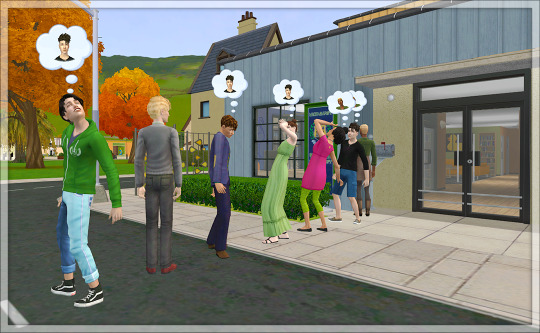
Marmaduke is hot stuff, it seems.

Edward certainly won the genetic jackpot.
~ Libra 2 / 10 / 6 / 10 / 3
~ Artistic / Over-emotional / Good Sense of Humour / Hopeless Romantic / Workaholic
~ OTH: Arts & Crafts
~ Favourite Colour(s): Yellow / Red
~ Aspiration: Romance / Knowledge
~ Turn-ons / -off: +Artistic / +Alien / -Blonde Hair
~ Major: Art





Couldn't you two wait until I'd finished your makeovers at least? Keziah and Nathan sneak their first kiss - with each other - the moment they get through the doors!

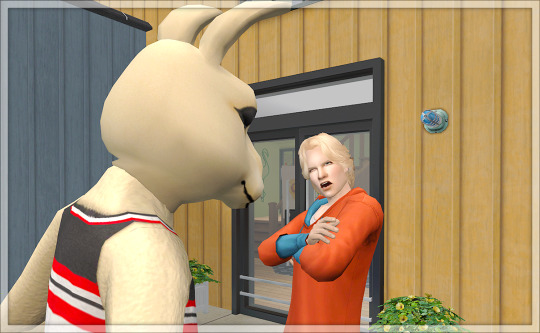
Nathan is a Sim that is entirely comfortable with himself, and sees no reason to change his image.
~ Libra 6 / 8 / 6 / 2 / 10
~ Friendly / Athletic / Neat / Can’t Stand Art / Schmoozer
~ OTH: Fitness
~ Favourite Colour(s): Red / Blue
~ Aspiration: Popularity / Romance
~ Turn-ons / -off: +Athletic / +Well-liked / -Occult
~ Major: Political Science

Keziah on the other hand is after a new look for her new life. I don't think this one is working for me either though.

For Edward and his teenage sweetheart Erasmus - despite being polar opposites - it's definitely love.

And Marmaduke still hasn't got over his teenage crush on best friend Louisa.




For Sally though, it goes much deeper. Louisa however, is not ready to commit.


Marmaduke is also not having a lot of success in the romance game.

Never mind, Marmaduke - you're a good-looking lad, and I'm sure it's just a case of finding the right girl.
~ Gemini 4 / 7 / 9 / 1 / 3
~ Genius / No Sense of Humour / Dog Person / Diva / Ambitious
~ OTH: Sport
~ Favourite Colour(s): Primaries
~ Aspiration: Fortune / Romance
~ Turn-ons / -offs: +Athletic / +Serious / -Rebellious
~ Major: Biology

Shy William is also struggling with the social aspects of student life.

Until he manages to find a bit of common ground with Marmaduke.
~ Cancer 7 / 3 / 6 / 4 / 9
~ Coward / Shy / Natural Cook / Eco-friendly / Avant Garde
~ OTH: Cuisine
~ Favourite Colour(s): Mauve
~ Aspiration: Family / Knowledge
~ Turn-ons / -off: +Reserved / +Tidy / -Infamous
~ Major: Literature

Keziah finally settles on a new image - for now.
~ Pisces 3 / 4 / 5 / 4 / 6
~ Absent-minded / Rebellious / Eco-friendly / Brooding / Avant Garde
~ OTH: Film & Literature
~ Favourite Colour(s): Orange / Blue
~ Aspiration: Knowledge / Pleasure
~ Turn-ons / -off: +Reserved / +Unique / -Fitness
~ Major: Mathematics

And Sally just makes the best faces.
~ Cancer 10 / 5 / 8 / 2 / 4
~ Athletic / Brave / Perfectionist / Avant Garde / Proper
~ OTH: Fitness
~ Favourite Colour: Magenta
~ Aspiration: Fortune / Knowledge
~ Turn-ons/off: +Fitness / +Cultured / -Laid Back
~ Major: Economics
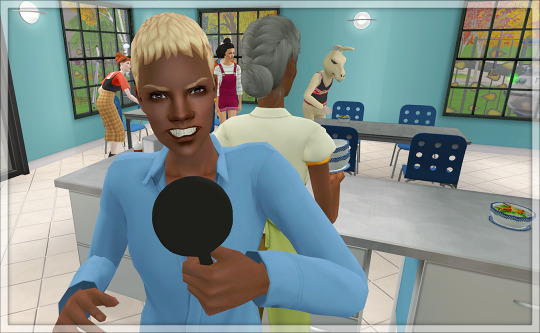
Louisa is also trying out a makeover - not just of their appearance, but their name too. From now on, they've decided that they would prefer to be called Louie.
~ Aries 5 / 9 / 7 / 5 / 2
~ Diva / Hot-headed / Natural Cook / Workaholic / Schmoozer
~ OTH: Cuisine
~ Favourite Colour(s): Light Blue
~ Aspiration: Romance / Fortune
~ Turn-ons / -off: +Stylish / +Brown Hair / -Laid Back
~ Major: Philosophy

While the others are experimenting with new images and new relationships, Erasmus is just stressing about his workload.
~ Aries 6 / 5 / 3 / 2 / 4
~ Brave / Cat Person / No Sense of Humour / Computer Whiz / Can't Stand Art
~ OTH: Science
~ Favourite Colour(s): Lime Green
~ Aspiration: Knowledge / Family
~ Turn-ons / -off: +Alien / +Mechanical / -Daydreamer
~ Major: Mathematics

It's good to see these two settling their differences over a gaming session.


It seems I spoke too soon.
#sims 2#gameplay#merybury#de bourgh university#edward crawford#keziah dashwood#nathan bingley#erasmus collins#marmaduke elton#william bertram#sally fairfax#louie willoughby#louisa willoughby#kellynch hall
17 notes
·
View notes
Text
Do we lose something by adding 'blood' magic and giving Remus powers due to his lycanthropy?
So I think yes.
To me, the whole point about purebloods obsessing about their blood status is that it makes no real difference - in fact, it's probably way better to expand the gene pool - as Ron points out. The discriminating against muggle-borns is baseless. In fact, in the canon it's made clear by multiple characters that purebloods have no reason to think themselves superiour. If we add powers related to the bloodlines, it's like giving the purebloods a reason to be right. The aryan race stuff was just BS, and so is the belief that being pureblood makes you better.
I feel equally strongly about Remus having any special powers related to his condition. Yes we know Bill likes his steaks rare now, let's leave it at that please. Remus' condition is meant to be a metaphor for HIV / conditions that significantly affect your quality of life and importantly, your social and economic standing. Giving him some benefits just makes me feel sick. Being unwell is not a superpower, but what is a superpower is the strength to keep going (to the ability people can <3).
In fact, I don't even like it when the discrimination against him is downplayed. It's probably the most important reason why I don't like casanova Remus. Remus' confidence and life quality is significantly impacted by the prejudices against werewolves. In canon, he never let himself fall in love (until he was forced together with Tonks due to proximity) because he is a werewolf. This man would not go around making out/having sex with people left, right and centre. This man would not be surrounded by a whole cohort of people who knew he was a werewolf but didn't care. People didn't know because he kept it a secret and because the idea that there was a werewolf at school would have been preposterous. He wouldn't be popular - Remus wouldn't want that attention on him.
Remus was desperately dependent on the Marauders because they figured out what he was despite his best attempts to hide it (because the four were extremely close and James and Sirius were exceptionally bright). Remus knew how lucky and unusual it was that they stuck with him; and worked to make his transformations bearable - and fun even.
--
Adding magic powers to bloodlines - downplaying Remus' condition - these things takes away from some of the more serious discussions this series attempts to have with its readers. In my view.
7 notes
·
View notes
Text
Eden of the East Part I & Work Culture by Moure
This anime has a double storyline, one is how recent graduates like Saki Morimi are struggling to find stable employment due to the traditional thoughts and discrimination of society toward the younger generation, and the other portrays how a group of selected people (named Selecao) are provided with unlimited resources to save the country’s economic status. At the beginning of the anime, Saki says that Japan is a country that cannot run by itself, which means, politically interpreted, after WWII, Japan fell into the shadow of the US, which Japan relied on for many core elements including domestic social, political, or economic structure and, after years of development, cannot get rid of the influence of America. Corporate culture in Japan, for example, has become rigid due to such traditional structures, as Moure claimed in his article Work Culture. The company stands for traditions, but younger generations refuse to offer self-sacrifice for the company, which could lead to economic stagnation. Akira Takizawa, one of the chosen Selecao, despite his unlimited resources, still faces issues on how to fix Japan - that is, what does it mean to contribute to society? Here, the principle of capitalism, as money is considered the primary medium of value, is reflected through Mr. Outside’s game, where he wants to save Japan using his money, but whoever spends the money for their own wants will be eliminated. Additionally, various solutions appear to different Selecaos. Selecaos like Akira tend to limit the use of resources, as he only used ¥60 to make a difference by having the prime minister speak “I have nothing to say.” Other Selecaos, however, tend to use more radical approaches. The blue-haired female (no name yet) in the anime enjoys the approach of sacrificing other people’s lives. I still have a point to ponder: no Selecaos have ever asked Juiz directly to “help fix Japan.” I believe it is what the anime tries to convey that there is no simple solution to saving the country… Anyway, I look forward to the rest episodes to find out what is going to happen.

2 notes
·
View notes
Note
Do you think that there were chances to rebel against slavery in Slavers Bay?
Not only do I know there were, but the slaving societies that GRRM has written are so overinflated they should’ve been history long before Dány’s war.
The societies of Slaver’s Bay (and the Free Cities) are without a doubt slaving societies. A “slaving society” as described by influential historian Moses I Finley, is different from a “society with slaves” (which were most of ancient societies) where slavery was a small aspect of social/economic life; a slaving society had at least 20% slaves, there’s enough of them to create a cultural impact, and they’re an essential part of the economy. In Finley’s model, there are only 5 slaving societies in (Western) history: Greece, Rome, colonial US South, Caribbean, and Brazil. GRRM makes it clear that without slavery, Slaver’s Bay would collapse economically (as would the Free Cities further west). He provides comically high numbers of slaves in some of the Free Cities (slave to free are 3:1 in Lys, Myr, Tyrosh; and 5:1 in Volantis), but we hear of only a few slave rebellions in them (when the Doom of Valyria happened and they killed all the dragons surviving except the Targs’) until Dány, but why? In slaving societies, the threat of violence for rebelling was institutional and severe…but every one of those 5 had multiple examples of slave uprisings. And in some cases where the slaves outnumbered the elites by that level of magnitude, they were successful. The helots of Messenia took advantage of an earthquake and Thebes’ invasion of Sparta to revolt and eventually rebuild their old city, while the enslaved people of Haiti took advantage of the French Revolution/Napoleonic Wars to win their independence. It stands to reason as a hub of slavery that Slaver’s Bay has an enslaved population close to that of the Free Cities, but there’s never any uprising mentioned until Dány comes? Even though we know that natural disasters and institutional warfare took place in that area. And don’t tell me the magical Unsullied just prevented all rebellions forever; the Spartans were allegedly the best warriors in Ancient Greece, whole kingdoms couldn’t win against Roman consular armies, the French army defeated practically most of Europe during the Revolutionary/Napoleonic period…but there were slave rebellions that managed to beat all of them, even if temporarily (poor Spartacus). But we’re just supposed to assume that after the fall of Valyria—which TWOIAF did tell us coincided with slave rebellions against the dragonlords—absolutely none of these cities achieved any sort of lasting freedom for its enslaved people? Even when the source of the Valyrian might, the dragons, was gone and the elite could no longer rely on that violence to keep the population in line? They were all just suffering and waiting for a savior for centuries, despite being most of the city’s population (including much of the army) and there being only some backup for the elite? The USA had to outlaw educating enslaved people for fear of rebellion, but there were still uprisings; meanwhile, in Essos there’s no ban on education, but we hear of none in Slaver’s Bay? It’s absolute nonsense historically, and only serves to make the slavers look super evil and Dány to look more like an apparent hero; the byproduct is that the enslaved people are robbed of the spirit, agency, and solidarity that they had in real life.
89 notes
·
View notes
Text
education of HAIQIN | education + economic mobility
------------------------------------------------------------------------------
date: january 2 2025
------------------------------------------------------------------------------
The Education and Economic Mobility
of Haiqin
Pathway to Social Mobility
Impact on Social Mobility
Education in Haiqin is seen as the primary means for individuals, especially those from lower-income backgrounds, to rise above their economic status. The idea of education as empowerment is deeply ingrained in the culture. It is widely believed that academic and vocational achievements can elevate a person’s position in society, offering them better career opportunities, a higher standard of living, and increased social recognition.
Access to Education
Haiqin has achieved near-universal access to education, regardless of socio-economic background. Primary and secondary education are both free and compulsory, ensuring that all children, regardless of their family's financial situation, receive foundational education. Beyond this, a series of merit-based scholarships, grants, and community programs ensure that higher education is attainable for students from economically disadvantaged backgrounds.
Economic Disparities and Education
Despite widespread access, economic disparities still exist. Students from wealthier families often have access to better resources, extracurricular programs, and opportunities for networking. However, Haiqin has worked to mitigate this through initiatives that ensure equity in education. Specialized scholarships for marginalized communities, free preparatory programs for university entrance exams, and partnerships with private organizations help level the playing field, allowing the most promising individuals to rise to the top regardless of their economic standing.
Classroom Diversity
Haiqin’s education system encourages diversity and inclusivity within the classroom. Students from a variety of backgrounds—whether they are from rural or urban areas, different ethnicities, or varied socio-economic classes—study together. This inclusivity helps build social cohesion and fosters a collaborative environment that prepares students to engage with a wide variety of perspectives, skills, and values. The variety in student populations also encourages intercultural dialogue, enriching the educational experience.
Employment Opportunities and Workforce Readiness
Graduates and Employment Trends
Graduates of Haiqin’s educational system typically find abundant opportunities within the labor market. The country has a thriving economy, particularly in sectors related to technology, sustainability, and the arts, all of which rely heavily on skilled and educated workers. This demand for educated talent has led Haiqin’s educational institutions to focus on providing students with both theoretical knowledge and practical skills to meet the needs of a rapidly changing global economy.
Technology Sector:
With Haiqin’s commitment to innovation, many universities offer cutting-edge programs in fields like computer science, AI, renewable energy technologies, and environmental engineering. Graduates are highly sought after by both local companies and international corporations looking to invest in Haiqin’s expanding tech industry.
Sustainability:
The nation's commitment to environmental sustainability means that graduates with expertise in renewable energy, environmental policy, and conservation are in high demand. Educational institutions work closely with governmental bodies and private sectors to ensure a steady flow of highly trained professionals into this critical field.
The Arts and Cultural Industries:
Haiqin also places great emphasis on the arts, offering robust programs in music, dance, visual arts, and literature. The arts sector in Haiqin not only provides cultural enrichment but is also a significant part of the economy, attracting tourists and international collaborations. Graduates in these fields are encouraged to contribute both creatively and economically to the country’s cultural heritage.
Specialized Vocational Training
In addition to traditional degree programs, Haiqin places a high value on vocational training and apprenticeships. Technical institutes offer specialized training in various trades, from skilled labor in construction and manufacturing to IT support and mechanical engineering. This system ensures that there is a diverse labor force capable of meeting both high-tech and manual industry needs. Vocational training centers are integrated with local businesses to create a seamless transition from education to employment, benefiting both individuals and the economy.
Global Recognition and Influence
International Standing
Haiqin’s commitment to research, innovation, and academic excellence has led its universities to be highly regarded on the global stage. Institutions like the Haiqin Institute of Advanced Technology (HIAT), the National University of Haiqin (NUH), and the Haiqin Arts and Culture Academy attract students, professors, and researchers from around the world. These universities are known for their groundbreaking research in areas like sustainable energy, environmental engineering, medicine, and digital arts.
Collaborations with International Institutions
Haiqin's educational institutions engage in numerous partnerships with universities, think tanks, and research organizations globally. These partnerships help Haiqin maintain its position as a leader in technological innovation, while also ensuring that students and faculty have access to a broad spectrum of ideas, research resources, and educational tools.
Research and Innovation
Haiqin is home to some of the world’s leading research centers in renewable energy, space exploration, and genetic engineering. Research conducted in these fields often has global implications, and students and faculty are at the forefront of important global initiatives. Haiqin also hosts international conferences, where scholars and professionals from across the globe come to share their findings and collaborate on future advancements.
Attracting International Students
Haiqin’s education system is designed to be both inclusive and world-class, making it a popular destination for international students. Universities offer courses in multiple languages, including Mandarin, English, and other regional languages, making Haiqin an accessible and attractive study destination. International students bring diverse perspectives to the classroom, enriching the educational experience for all involved. The opportunity to study in Haiqin is seen as an investment in one’s future, both for career advancement and personal development.
#reality shifter#reality shifting#shiftblr#shifting community#shifting#shifting motivation#shifting reality#dr scrapbook#dr world#reyaint#anti shifters dni
2 notes
·
View notes
Text
The Philosophy of Metropolitanism
The philosophy of metropolitanism centers around the unique social, cultural, and economic dynamics of metropolitan (urban) areas and examines how these environments shape human experience, social structures, and values. Metropolitanism views cities as hubs of diversity, innovation, and complex social interactions, which stand in contrast to more traditional or rural ways of life.
Key Themes in Metropolitanism
Urban Identity and Cosmopolitanism: Metropolitanism often emphasizes cosmopolitan values, where individuals are exposed to a range of cultures, ideas, and lifestyles. Cities foster a sense of open-mindedness and adaptability, as people encounter diversity and interact with individuals from various backgrounds.
Collective and Individual Identity: In metropolitan environments, there is often a tension between collective urban identity (e.g., being a New Yorker, Londoner) and the individual’s quest for uniqueness. City life often supports personal expression while also creating a shared cultural experience within neighborhoods, workplaces, or social circles.
Innovation and Progress: Cities are frequently seen as engines of progress and change. The metropolitan lifestyle values innovation and entrepreneurship, spurred by dense social and economic networks that encourage rapid exchange of ideas, resources, and opportunities.
Alienation and Anonymity: Metropolitanism also considers the challenges of urban life, such as alienation, stress, and a sense of disconnection, despite being surrounded by people. Some argue that cities can lead to impersonal relationships, as individuals are constantly moving and adapting to the fast pace of urban life.
Social Complexity and Hierarchies: Cities create complex social structures, with different socioeconomic classes, professional networks, and communities. Metropolitanism examines how these layers contribute to both opportunity and inequality, and how urban policies impact issues like gentrification, housing, and public services.
Public Space and Community: The philosophy of metropolitanism also considers the importance of public spaces—parks, squares, and cultural sites—in fostering social cohesion and community life. These spaces serve as places for connection, recreation, and political expression, balancing the private and public spheres in dense urban landscapes.
Environmental and Sustainability Concerns: Urban environments are increasingly under scrutiny for their impact on the natural environment, and metropolitanism encompasses discussions on sustainable city planning, green spaces, and the need for eco-friendly solutions to address issues like pollution, traffic, and energy use.
Philosophical Perspectives on Metropolitanism
Urbanism and the Human Condition: Thinkers like Georg Simmel and Walter Benjamin have explored how city life affects the individual’s psyche, noting that the sensory overload and rapid pace of cities influence people’s ways of thinking and relating to one another.
Metropolitanism and Social Theory: Urban theorists, such as Henri Lefebvre, emphasize the “right to the city,” which argues that city residents should have a say in urban planning and access to its resources, promoting an ethical perspective on urban living.
Globalization and Cultural Exchange: Cities are often at the forefront of globalization, and metropolitanism reflects this interconnectedness, where metropolitan areas serve as cultural and economic nodes in a global network. This raises questions about cultural preservation, assimilation, and the impacts of international influence on local customs.
Critiques of Urban Capitalism: Many theorists critique the capitalist structures prevalent in urban centers, arguing that metropolitan areas often become sites of economic disparity, where wealth and poverty are starkly juxtaposed. Scholars like David Harvey analyze how urbanization serves capitalistic interests, often prioritizing profit over the welfare of city dwellers.
Postmodern Urbanism: Postmodernist thinkers suggest that metropolitan life challenges traditional norms and hierarchies, giving rise to new forms of community, identity, and cultural expression. The postmodern city is seen as a space of fragmentation but also of new opportunities for redefining social relations.
Influence and Application of Metropolitanism
Metropolitanism has practical implications in urban planning, sociology, and environmental policy. It influences how cities are designed, addressing issues of accessibility, inclusivity, and sustainability. Additionally, metropolitanism shapes cultural policy and education, as cities are hubs for art, music, and intellectual exchange. It also informs political theory, with cities often being centers for social movements and advocacy for issues like civil rights, environmentalism, and economic equality.
#philosophy#epistemology#knowledge#learning#education#chatgpt#Metropolitanism#Urban Philosophy#Cosmopolitanism#Urban Identity#City Life and Community#Social Theory and Urban Studies
2 notes
·
View notes